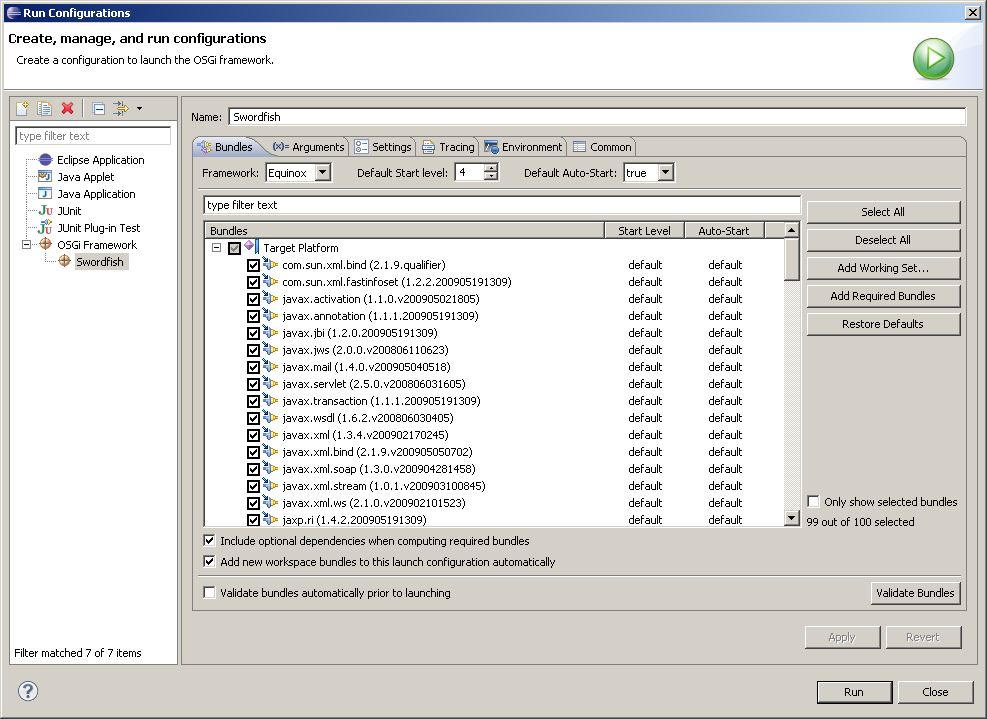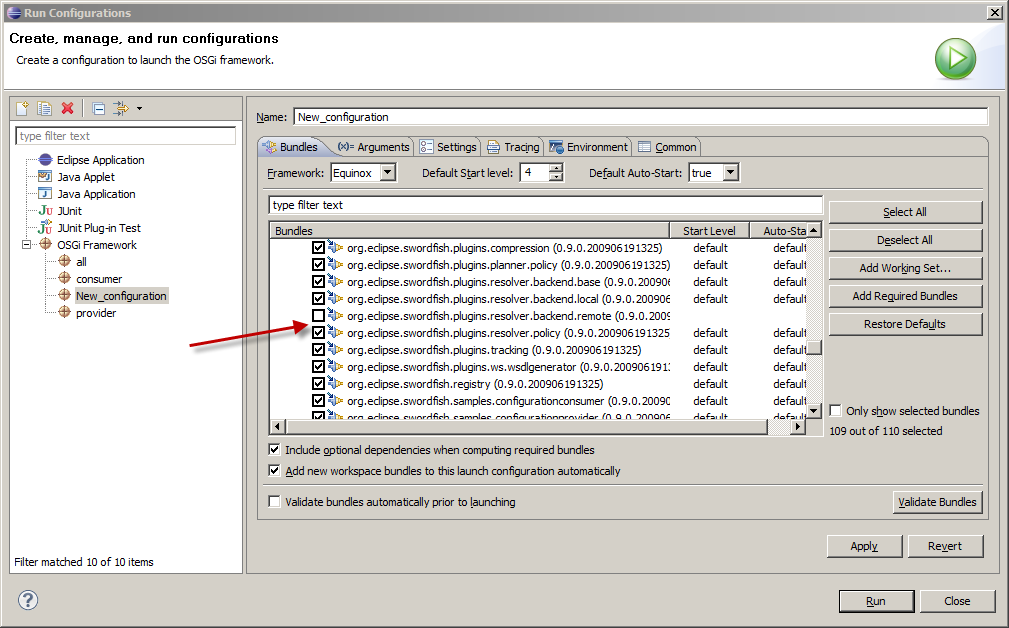Notice: This Wiki is now read only and edits are no longer possible. Please see: https://gitlab.eclipse.org/eclipsefdn/helpdesk/-/wikis/Wiki-shutdown-plan for the plan.
Swordfish Documentation: Launching Service Registry
Prerequisites
Eclipse Galileo (Eclipse 3.5) build or later. The examples described here are based on Eclipse 3.5.
This "How To" assumes that user has downloaded and activated Swordfish Target Platform with Swordfish Runtime (core) bundles and Swordfish Registry bundles included in the installation. To complete the prerequisites, follow steps described here:
- Running Target Platform - to set up a target platform on your local machine
- Setting Up Registry From the Galileo Update Site - to set up a target platform from an update site.
Launching Service Registry
Service registry expose its interface as http REST service.
- In the Run Configurations... dialog create a new OSGi configuration based on Swordfish target platform.

- Switch to the Arguments tab and type the following VM arguments:
-Dorg.osgi.service.http.port=9001 -Dorg.eclipse.swordfish.registry.fileLocation="C:\swordfish\repository" -Dosgi.noShutdown=true -Dservicemix.base=. -Dorg.osgi.framework.system.packages="com.sun.jimi.core,com.sun.net.ssl,com.sun.net.ssl.internal.ssl, com.sun.org.apache.xalan.internal,com.sun.org.apache.xalan.internal.res,com.sun.org.apache.xalan.internal.xsltc.trax, com.sun.org.apache.xerces.internal.dom,com.sun.org.apache.xerces.internal.jaxp,com.sun.org.apache.xerces.internal.xni, com.sun.org.apache.xml.internal,com.sun.org.apache.xml.internal.utils,com.sun.org.apache.xpath.internal, com.sun.org.apache.xpath.internal.jaxp,com.sun.org.apache.xpath.internal.objects,com.sun.xml.fastinfoset.dom, com.sun.xml.fastinfoset.sax,com.sun.xml.fastinfoset.stax,javax.annotation,javax.annotation.security,javax.crypto, javax.crypto.interfaces,javax.crypto.spec,javax.imageio,javax.imageio.metadata,javax.imageio.stream,javax.jms, javax.management,javax.management.loading,javax.management.modelmbean,javax.management.remote,javax.naming, javax.naming.directory,javax.naming.spi,javax.net,javax.net.ssl,javax.rmi,javax.security.auth, javax.security.auth.callback,javax.security.auth.login,javax.security.auth.spi,javax.security.auth.x500, javax.security.cert,javax.security.sasl,javax.sql,javax.swing,javax.swing.event,javax.xml.datatype,javax.xml.parsers, javax.xml.namespace,javax.xml.transform,javax.xml.transform.dom,javax.xml.transform.sax,javax.xml.transform.stream, javax.xml.validation,javax.xml.xpath,org.jvnet.fastinfoset,org.jvnet.staxex,org.omg.CORBA,org.omg.CosNaming, org.w3c.dom,org.w3c.dom.bootstrap,org.w3c.dom.ls,org.w3c.dom.traversal,org.xml.sax,org.xml.sax.ext,org.xml.sax.helpers, sun.misc,sun.security.provider,javax.activation,org.omg.CORBA.TypeCodePackage,org.omg.CORBA.portable, org.omg.PortableServer,org.omg.PortableServer.POAPackage,javax.swing.border,org.w3c.dom.events,org.w3c.dom.html,org.w3c.dom.ranges"
First 2 arguments related to Swordfish registry:
- org.osgi.service.http.port - the port number witch will be used to expose Service Registry as http service. 9001 - the default port that the remote resolver uses to connect to the Swordfish registry.
- The next property org.eclipse.swordfish.registry.fileLocation must point to the directory where all the WSDL files that need to be loaded by the registry are placed.
- Create folder for Swordfish Registry File Location and change corresponding org.eclipse.swordfish.registry.fileLocation property in launch configuration.
- Run new Launch Configuration ant go to http://localhost:9001/registry/wsdl/ URL in your browser.
You'll see page with empty table and Swordfish Logo, thats fine because org.eclipse.swordfish.registry.fileLocation property probably points to empty folder. Copy some arbitrary wsdl files to above mentioned folder and refresh web page.

Local and Remote Service Resolvers
Swordfish uses service resolvers retrieve service description (wsdl and agreed policy). Currently Swordfish supports local and remote resolvers:
- org.eclipse.swordfish.plugins.resolver.backend.remote - remote resolver communicate with remote Swordfish registry using REST http calls.
- org.eclipse.swordfish.plugins.resolver.backend.local - local resolver not executes remote calls and retrieves service descriptions for local folder. By default this is org.eclipse.swordfish.plugins.resolver.backend.local\src\main\resources\wsdl folder.
Remote resolver perfect for production environment and Local resolver convenient for local development and testing, for example out of box Swordfish Samples (also available for Download from Galileo Update Site) by default work with Remote resolver. To switch between resolver type you can simply enable resolver type you need in Runtime configuration and disable other. For example, on the picture below you see Local resolver activated:

